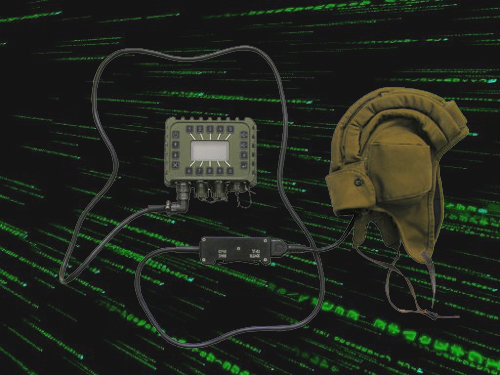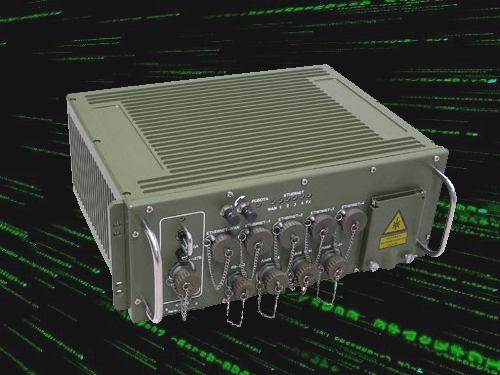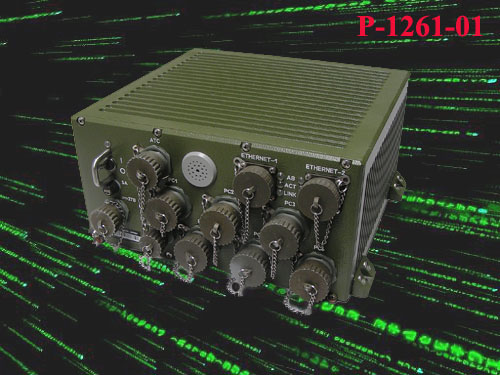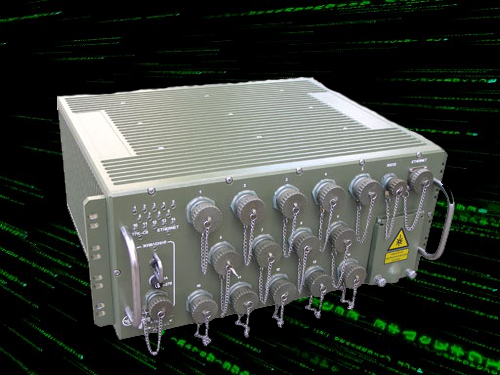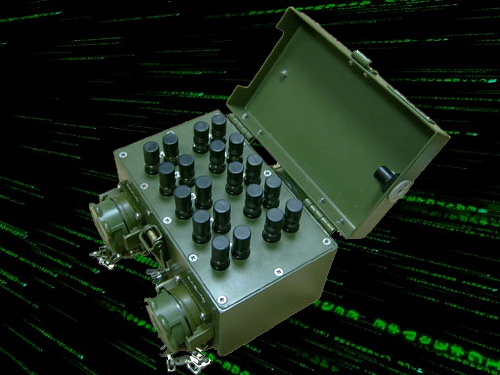- Details
- Written by Super User
- Category: Communication means
- Hits: 5610
UCD terminal (User Control Device) enables users to access communication services within their own vehicle, or in vehicles to which they are networked.
The terminal can be used in environmental characteristics:
- ambient temperature from - 35 º to + 50 º C
- relative humidity of not more than 98% at 25 º C
- ambient pressure of 60 kPa to 113 kPa .
Technical specifications:
Types of communication:
- the inner-sided telephone
- external bilateral telephone on any of the stations
- external bilateral telephone on any of the telephone lines
Management:
- management of the terminal is held on the front panel.
- control and adjustment may carried out by a computer via RS-232 or network Ethernet 10/100 BASE-T.
Power is carried out by a direct current voltage of 18-36 V with protection against wrong polarity changes.
Dimensions (w, g, h): 172x124x55mm.
- Details
- Written by Super User
- Category: Communication means
- Hits: 5577
VoIP Gateway K-1220 is designed to provide voice data for IP-data networks.
The gateway can be used in climatic conditions:
- ambient temperature from 238 to 323 K (from - 35 º to + 50 º C)
- relative humidity of not more than 98 % at 298 K (25 º C)
- atmospheric pressure of 60 kPa to 113 kPa.
The weight of the gateway - no more than 18 kg
Dimensions:
- Lengh - 490 mm;
- Width - 490 mm;
- Height - 300 mm
Technical specifications:
Gateway provides connectivity:
- 20 analog phones for two-wire subscriber lines (lines FXS);
- four-wire analog connection lines to connect to a private automatic branch exchange (PBX) (Line FXO);
- five devices enabled for Ethernet 10Base-T/100Base-TX;
- a device that supports the technology, Ethernet 100Base-FX;
- a personal computer (PC) through the RS-232
- an analog service with the TA local battery.
For the analog subscriber lines Gateway provides:
- the ability to install a voice connection with any local subscribers of the gateway and remote subscribers from other gateways
- reception rooms in the momentum and in the tone (DTMF) set
- the generation of tone for FXS lines and detection tone for lines FXO;
- the call forwarding service
- transfer of facsimile (fax transmission protocol is supported through VOIP - T. 38).
Gateway supports the following voice codecs:
- G.711 (A-Law, u-Law);
- G.723.1;
- G.729 a / b.
To improve the quality of the voice gateway uses algorithms for echo cancellation G.165 / G. 168.
For correct transmission of DTMF tones on IP-networks gateway supports the protocol RFC2833.
To establish a VoIP-connections on IP-networks, the gateway supports the following signaling protocols:
- ITU-T H.323 version 4 (read more - H.323);
- SIP RFC3261 2.0 (more - SIP).
Gateway has the opportunity to work as a central device for interoperability of other VoIP-devices (terminals , gateways, telephones, VOIP). This gateway supports the following protocols:
- H.323 Gatekeeper;
- SIP Proxy with the function of the Registrar (read more - SIP Proxy / registrar).
To allow for flexible adjustment of the registration plan gateway supports the numbering system E.164 public networks.
Power sypply:
- DC 27 V with a limit deviation of voltage from 18 to 36 V.
- Details
- Written by Super User
- Category: Communication means
- Hits: 5665
Radio Gateway R-1261 is designed to provide interface between radio nets, digital automatic communication switchboard systems (DACSs) and LANs in stationary and combat communication systems; information exchange between counterpartners of radio nets and telephone users, as well as users of automated control systems.
R- 1261 operates in the following climatic conditions:
- temperature of ambient environment is in the range from 238 to 323K (from -350 to +500 C)
- relative humidity is not more than 98% under the temperature of 298K (250 C)
- air pressure is from 60 кPa to 113 кPа (from 450 to 850 mm.m.c).
Weight is not more 25 kg
Dimensions:
- Length – 490 mm;
- Width – 490 mm;
- Height – 300 mm.
Specifications
Radio Gateway R-1261 provides connection of:
- six VHF and HF tactical radios in simplex, half-duplex and duplex modes;
- six analog telephones;
- digital telephone set (ISDN BRI channel);
- PC at RS-232-interface;
- two external LANs at Ethernet 10 Base-T-interface;
- one ISDN BRI channel;
- two analog trunks from DACS.
Radio Gateway R-1261 provides message exchange of:
- radiotelephony and data transfer between counterpartners of different radio nets;
- radiotelephony between counterpartners of radio nets and analog telephone users;
- radiotelephony and data transfer between counterpartners of radio nets and digital ISDN telephone users;
- radiotelephony and data transfer between counterpartners of radio nets and terminal equipment (digital telephone set and PC), connected directly to the radio gateway.
Radio Gateway R-1261 provides automatic connection and data exchange of:
- counterpartners of different radio nets with radio stations, connected to the radio gateway;
- counterpartners of radio nets with users of ATS ;
- users of ATS with counterpartners of radio nets;
- counterpartners of radio nets with users of LAN workstations;
- users of LAN workstations with counterpartners of radio nets;
- counterpartners of radio nets with radio gateway operator;
- radio gateway operator with counterpartners of radio nets;
- users of ATS (analog and ISDN) with radio gateway operator;
- radio gateway operator with users of ATS (analog and ISDN);
- radio gateway operator with users of LAN workstations;
- users of LAN workstations with radio gateway operator.
Power supply:
Power supplying is provided by direct current 27 V with extreme voltage deviation from 18 to 36V.
- Details
- Written by Super User
- Category: Communication means
- Hits: 5791
Path Switching and Multiplexing Equipment К – 1301 (PSME) is designed to provide operational switching and multiplexing (demultiplexing) multi-speed paths in integrated communications hardware for various purposes.
PSME operates in the following climatic conditions:
- temperature of ambient environment is in the range from 243 to 323K (from -300 to +500 C)
- relative humidity is not more than 98% under the temperature of 298K (250 C)
- air pressure is from 60 кPa to 113 кPа (from 450 to 850 mm.m.c).
PSME weight is not more 45 kg
Dimensions:
- Length – 460 mm;
- Width – 555 mm;
- Height – 240 mm
Specifications
-
PSME provides connection and processing up to 48 grouped flows with transfer rate up to 2048 kbps or 12 grouped flows with transfer rate 8448 kbps each according to ITU-Т G.703 и ITU-Т G.704 international recommendations in АМІ codes (only for 2048 kbps) or HDB 3.
- PSME has two grouped fiber-optic paths.
-
PSME performs crossing of grouped flows with each other and converting of their electrical parameters according to the standards, which are used, while working with the same rate.
-
PSME has the possibility to multiplex any four Е1paths with the rates 2048 kbps in one Е2 path with the rate 8448 kbps.
- PSME has the possibility to demultiplex any Е2 path with the rate 8448 kbps into four Е1paths with the rate 2048 kbps.
-
The possibility to enclosure loops of digital flows to the side of channel-forming hardware and to the side of home equipment is implemented in PSME.
Mean-time-between-failures is not less 5000 hours.
Power supply:
DC: 27 V with extreme voltage deviation from 18 to 36V.
- Details
- Written by Super User
- Category: Communication means
- Hits: 5566
Army Cross-Connecting Module КР-351 is designed to provide line connection of user’s data terminal equipment of different kinds of communication (telephony, telegraphy, etc.) in stationary and field communication systems, which are pars of user networks of automatic and manual switching system.
Army Cross-Connecting Module operates in the following climatic conditions:
- temperature of ambient environment is in the range from 238 to 323K (from -350 to +500 C)
- relative humidity is not more than 98% under the temperature of 298K (250 C)
- air pressure is from 60 кPa to 113 кPа (from 450 to 850 mm.m.c).
Army Cross-Connecting Module weight is not more 3,0 kg
Dimensions:
- Length – 200 mm;
- Width – 200 mm;
- Height – 140 mm
Specifications:
Army Cross-Connecting Module provides:
-
connection up to ten double-wire or up to five four-wire subscriber lines with P-274P cable or similar to utility shed (station), using PTRK10х2 army cable;
-
transit of two groups with five double-wire lines or with two four-wire subscriber lines, each of them uses PTRK 10х2 army cable from the station side (hardware half-coupling AL1-10) and two PTRK 5х2 army cables from the subscriber side (hardware half-coupling AL1-5 and AL5-10).
There are no integral power supplies in Army Cross-Connecting Module, and it doesn’t require connection to external power supplies.
Army Cross-Connecting Module provides protection of subscriber lines (separately) against overrating voltage and overcurrents, as well as lightening discharges, which can influence their operability.



